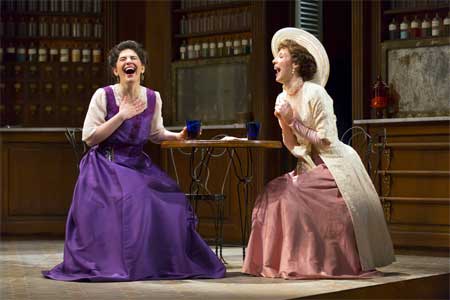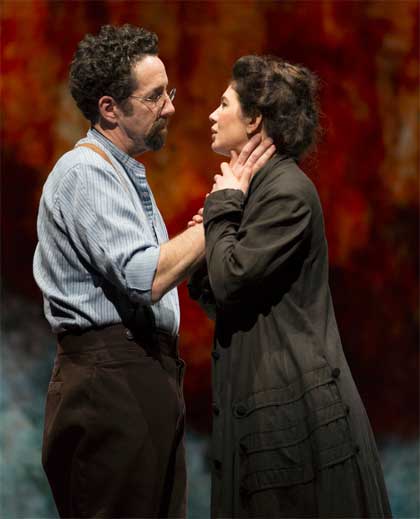Play (2014)
by Melinda Lopez
Directed by M. Bevin O’Gara
Huntington Theatre Company
Calderwood Pavilion, Boston Center for the Arts, South End, Boston, MA
March 28 – May 3, 2014
Scenic Design: Cameron Anderson; Costume Design: Andrea Hood; Lighting Design: Yi Zhao; Sound Design and Composition: Arshan Gailus
With Christina Pumariega (Adela), Rebecca Soler (Martina), Juan Javier Cardenas (Manny), Christopher Tarjan (Davis), Christopher Burns (Isador/Conquistador), Marianna Bassham (Fancy/Hatuey’s wife), Brandon Barbosa (Chucho/Mambi)

Marianna Bassham
in “Becoming Cuba”
Photo: T. Charles Erickson
Courtesy of Huntington Theatre Company
Adela (Christian Pumariega) runs a pharmacy in Havana where her sister, Martina (Rebecca Soler), helps her out, sort of. Amid visits from privileged colonialists, a vagrant, revolutionary half-brother of Adela’s and Martina’s, Manny (Juan Javier Cardenas), appears, signalling the weight of impending social change. An American journalist, Davis (Christopher Tarjan), soon enters the picture, both to add perspective and romance.
The bold opening Hispanic notes of Arshan Gailus’ soundscape sets a majestic and captivating tone for this play about the germs of the Cuban revolution against Spanish and United States colonialism. It hovers between a seductive history lesson and a collage of tragedy, irony, and romanticism that does not always fuse into a compelling whole.
One can indeed learn from this play much about Cuba of the era and the psychology of those, like Adela, straddled between identification with traditional Spanish colonial sensibilities and identification with those fighting for Cuban independence. To that end the play succeeds very well. As Adela, Christina Pumariega gives a strong and noble performance; her graceful but ultimately fraught bearing captures these tensions splendidly.

Christina Pumariega as Adela
in “Becoming Cuba”
Photo: T. Charles Erickson
Courtesy of Huntington Theatre Company
Other things work less well.
The two acts are introduced in a comedic way by a Conquistador (Christopher Burns) who declares boisterously in quoting Shakespeare’s Macbeth that “blood will have blood” and establishes firmly in our minds the connection between the horrors of Spanish conquest of the 15th century and those at the turn of the 20th. But the comedy, though a bold attempt to stretch the ironic dimensions of the play, does not really fit.
That is generally true of the writing, which seems not to ever settle on a tone that feels consistent. There is an out-of-place feeling to many of the lines, either semantically inappropropriate for the age (Would an elegant lady of that era use fuck in the way she does in the play?) or just oddly out of place.
The play tries to create a romantic story and does it quite well, giving a fair sense of the growing chemistry between Adela and Davis, but then fabricates complications which just seem artificial and out of place. When, near the end, the time comes for departures between major characters, they seem far too abrupt. And the very end, in theoretically retying political and romantic elements, just struck me as embarrassingly awkward.
Some of the acting is very good.
Christina Pumariega as Adela, as noted, has a wonderful, graceful majesty that carries the production, as far as it goes. She calls to mind a very elegant, young, Anne Bancroft, serious, and seriously charming.
Christopher Tarjan (Davis), as the American journalist, has a staccato urgency which works well against Adela’s gravitas.
Nonetheless, Lopez’ narrative does not quite do justice to the evolution of their relationship, always trying to seal a deal one way or another when a more subtle cue would have been far better. When Lopez has them hover on the edge of desire, the relationship has a kind of magic. As soon as she starts cutting and pasting the narrative, that magic disappears. Too bad – Adela’s character and situation, though quite vivid and distinctive, seem just a few more drafts away from being far more dramatically realized.
Marianna Bassham, a fine local actress, has a good turn as the neurasthenic Spanish colonialist wife, giving the role the loopiness it deserves.
The shortcomings of the play are not helped by the direction, which, at least in the performance I saw, seemed not to rectify the inconsistencies of tone. The danger of trying to write light comedy into high tragedy is that it puts enormous weight on a director to correct all the subtle balances. Perhaps those lines just fell apart the night I saw the show, though I saw enough evidence of vulnerabilities in the writing to think the issue was more pervasive.
Despite those issues, the show has significant interest as an historic piece, and, Christina Pumariega as Adela offers a compellingly elegant and forceful lead.
– BADMan
Leave a Reply